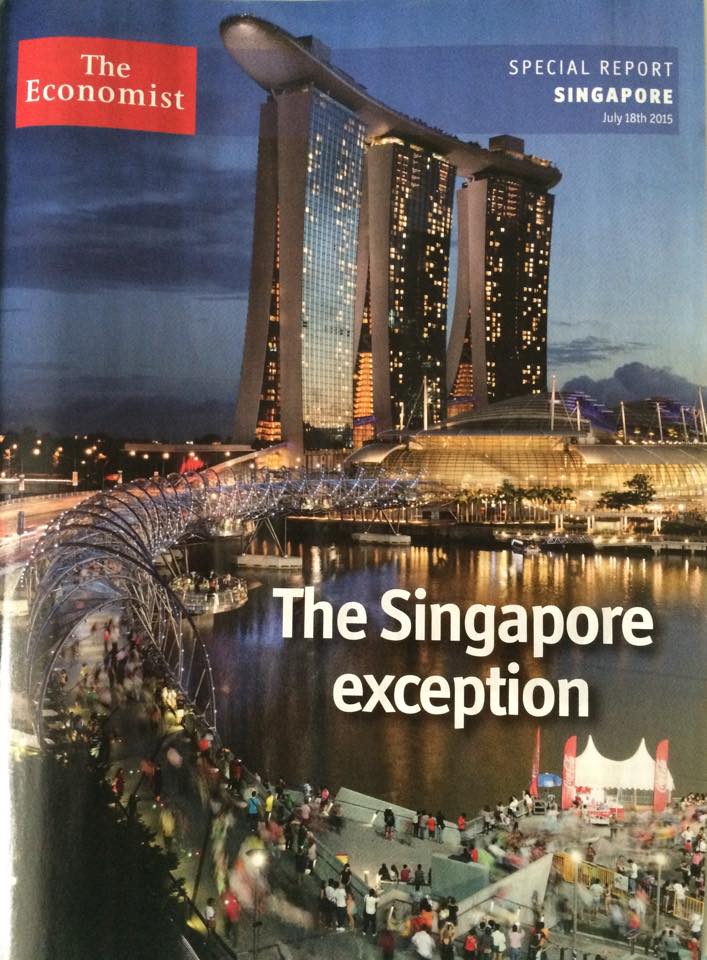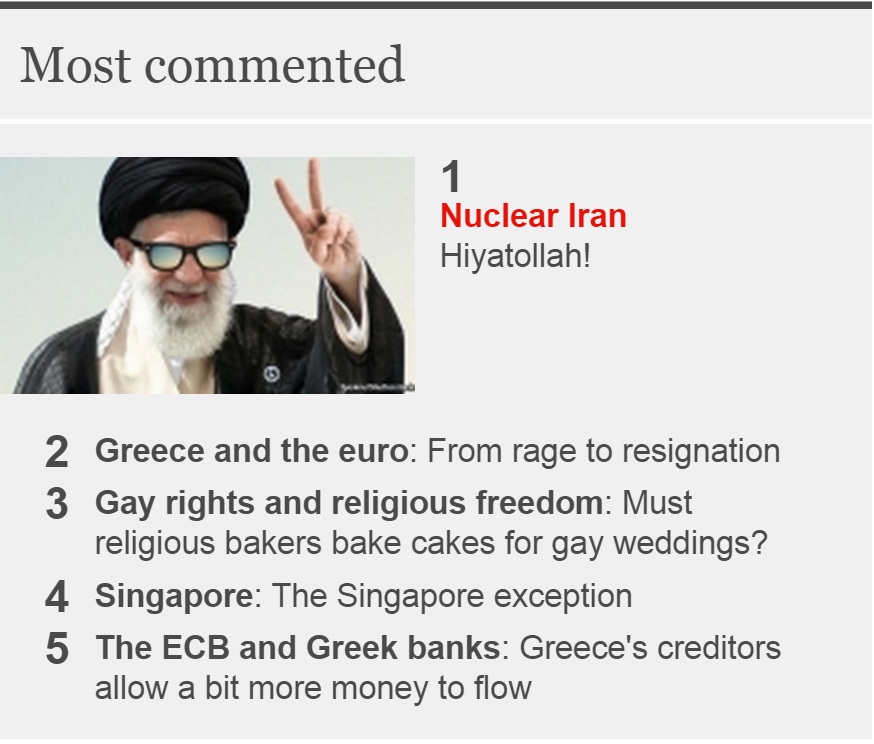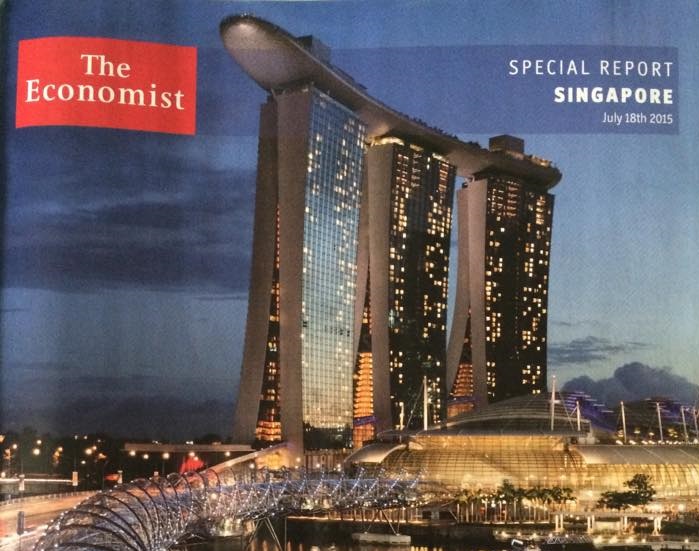The late Prime Minister Lee Kuan Yew was wrong.
On Sep.16, 1955, he told the Foreign Correspondents Association:
"I have no headline material to offer you tonight. In fact, I believe that the art of Government is, in part, the art of not creating headlines in the world press."
Nearly 60 years later, however, highly respected international publication The Economist created good headlines for Singapore by publishing a special ten-page report on The Singapore Exception in its July 18 - 24 issue.
 Photo taken of The Economist special report
Photo taken of The Economist special report
The series has garnered much online attention, with one of its articles ranking among the top five most-commented pieces on The Economist's website.
 Source: The Economist
Source: The Economist
Now, if you're thinking the Singapore government has commissioned this special advertorial as part of its SG50 celebrations, you've made, to your surprise, an incorrect assumption.
Trawling the gamut of reports will reveal that none of the PAP politicians or Ministers were involved or interviewed for them.
Anyway, here are three takeaways from The Economist's special report:
1. There is a big difference between a well-informed foreign media and an ill-informed one:
At the risk of Mothership.sg sounding like a western media apologist, The Economist published a fair and balanced overview of Singapore's strengths and challenges — warts and all.
Simon Long, the Banyan columnist and a Singapore resident for nearly five years, follows Singapore politics closely and interviewed a number of senior civil servants, academics, civil society leaders, media practioners and even members from the Workers' Party for the report.
My "special report" on Singapore at 50 is published in this week's Economist: The Singapore exception http://t.co/2Suy079sf8
— Simon Long (@simonlong55) July 17, 2015
In fact, Long's interest in the region dated back two decades, when he spent some time in Hong Kong and Singapore in the 1990s, reporting for the BBC.
Compare his work to the "stop-over journalism" that The Guardian did earlier this year (click image for article):
 Source: Mothership.sg
Source: Mothership.sg
Oliver Milman, a reporter at The Guardian Australia, painted a rather bleak picture of Singapore with several sensational claims. For his epic investigative masterpiece, he interviewed a grand total of three people — all while staying at the Raffles Hotel for a very lengthy three days.
Or CNN's booboo, when they stupidly fell victim to an amateur doctored image circulated online on March 18, 2015, indicating that Lee Kuan Yew had passed away (click image for article):
 Source: Mothership.sg
Source: Mothership.sg
Awww, let's cut them some slack, perhaps — poor CNN doesn't have a Singapore office here, from our recent check on the government-run Singapore press centre — how can we possibly expect them to be accurate?
2. Foreign media dish out "hard truths" that the local mainstream media is too polite to highlight (unless they are from Lee Kuan Yew)
Here are ten lines from The Economist that you probably would not see in Singapore's mainstream media:
1. In line with his maxim that “poetry is a luxury we cannot afford,” it was ruthlessly pragmatic, enabling him to rule almost as a (mostly) benevolent dictator. ("The Singapore exception", The Economist)
2. For such a persuasive government, the failure of the campaign to raise fertility suggests a lack of will... it has presented the government with one of its biggest political challenges: high immigration. This has become a source of great discontent, but there is no plan B. ("Seven million is a crowd", The Economist)
3. The government also benefits from a tame mainstream press that is largely hostile to the opposition and rarely covers it between elections. ("Performance legitimacy", The Economist)
4. During the campaign itself, it (mainstream media) tends to favour the government in the crudest way. "Is S'pore ready for a gay MP?" asked a headline in 2011 in the New Paper, a tabloid, about an opposition candidate. ("Performance legitimacy", The Economist)
5. Suggestions of nepotism are especially likely to result in a suit. To Lee Kuan Yew, success running in families proved not that the system is rigged but that talent is hereditary. ("Performance legitimacy", The Economist)
6. Another deterrent to opposition is the apparent hopelessness of the cause and the petty bickering of a camp that now includes no fewer than eight parties, some little more than vehicles for their leaders. ("Performance legitimacy", The Economist)
7. For the party (PAP), perhaps the most worrying aspect of recent political developments is that is seems to be having trouble finding a parliament's worth of credible representatives. ("Performance legitimacy", The Economist)
8. Nevertheless, the secrecy (over Singapore's reserves) gives rise to occasional rumours that the reserves are smaller — or more probably bigger — than most suspect. ("The years that were fat", The Economist)
9. With better public transport, it may be politically possible to steer Singapore away from the car. ("Many spokes to its hub", The Economist)
10. In fact, Singapore mostly presents (itself) as a picture of racial harmony. Some suspect these laws (laws prohibiting speech that might cause racial/religious offence) are used to silence government critics. But many Chinese who queued up to pay their respects to Lee Kuan Yew commented that few Malays seemed to join in. ("The social contract", The Economist)
Let's see whether Singapore's High Commissioner to the United Kingdom will contribute to The Letters to the editor for clarifications this Friday.
3. The Economist has rightly pointed out one of the main dividing lines of the next GE
To be exceptional or to be normal?
Prime Minister Lee Hsien Loong told the audience during his May Day Rally address this year that Singaporeans have to keep Singapore exceptional to survive.
“Singaporean exceptionalism” was also discussed during DPM Tharman Shanmugaratnam's tour de force performance at the 45th St Gallen Symposium on May 7 in Switzerland.
The Economist observed that there are "plenty of reasons to be optimistic about Singapore's economic future" and argued that "Singapore is better equipped than most countries to avoid the worst outcomes".
Its argument, however, is that the "miracle city-state" will need to change its ways to flourish in the next 50 years.
In other words, it can afford "to be less of an exception, more of a normal country".
Status quo or the type of "normal" political systems that we witness in the United States or the United Kingdom?
One thing's for sure, though — Singaporeans will get to decide on the type of society they want sooner than we might expect.
Top photo by us.
If you like what you read, follow us on Facebook and Twitter to get the latest updates.
If you like what you read, follow us on Facebook, Instagram, Twitter and Telegram to get the latest updates.

